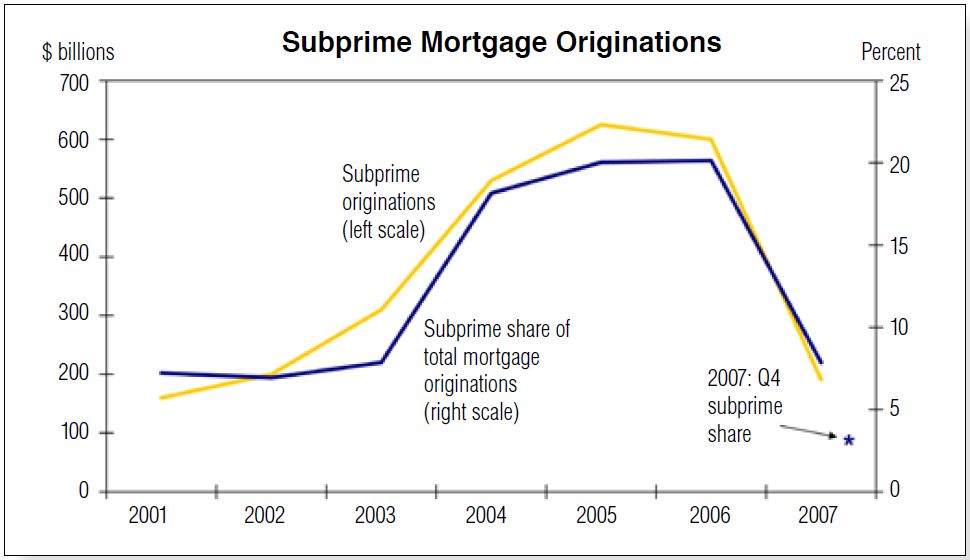Dad2three
Gold Member
Battling QUOTES!!!
The White House released this list of attempts by President Bush to reform Freddie Mae and Freddie Mac since he took office in 2001.
Unfortunately, Congress did not act on the presidents warnings:
** 2001
April: The Administrations FY02 budget declares that the size of Fannie Mae and Freddie Mac is a potential problem, because financial trouble of a large GSE could cause strong repercussions in financial markets, affecting Federally insured entities and economic activity.
** 2002
May: The President calls for the disclosure and corporate governance principles contained in his 10-point plan for corporate responsibility to apply to Fannie Mae and Freddie Mac. (OMB Prompt Letter to OFHEO, 5/29/02)
** 2003
January: Freddie Mac announces it has to restate financial results for the previous three years.
February: The Office of Federal Housing Enterprise Oversight (OFHEO) releases a report explaining that although investors perceive an implicit Federal guarantee of [GSE] obligations, the government has provided no explicit legal backing for them. As a consequence, unexpected problems at a GSE could immediately spread into financial sectors beyond the housing market. (Systemic Risk: Fannie Mae, Freddie Mac and the Role of OFHEO, OFHEO Report, 2/4/03)
September: Fannie Mae discloses SEC investigation and acknowledges OFHEOs review found earnings manipulations.
September: Treasury Secretary John Snow testifies before the House Financial Services Committee to recommend that Congress enact legislation to create a new Federal agency to regulate and supervise the financial activities of our housing-related government sponsored enterprises and set prudent and appropriate minimum capital adequacy requirements.
October: Fannie Mae discloses $1.2 billion accounting error.
November: Council of the Economic Advisers (CEA) Chairman Greg Mankiw explains that any legislation to reform GSE regulation should empower the new regulator with sufficient strength and credibility to reduce systemic risk. To reduce the potential for systemic instability, the regulator would have broad authority to set both risk-based and minimum capital standards and receivership powers necessary to wind down the affairs of a troubled GSE. (N. Gregory Mankiw, Remarks At The Conference Of State Bank Supervisors State Banking Summit And Leadership, 11/6/03)
** 2004
February: The Presidents FY05 Budget again highlights the risk posed by the explosive growth of the GSEs and their low levels of required capital, and called for creation of a new, world-class regulator: The Administration has determined that the safety and soundness regulators of the housing GSEs lack sufficient power and stature to meet their responsibilities, and therefore should be replaced with a new strengthened regulator. (2005 Budget Analytic Perspectives, pg. 83)
February: CEA Chairman Mankiw cautions Congress to not take [the financial market's] strength for granted. Again, the call from the Administration was to reduce this risk by ensuring that the housing GSEs are overseen by an effective regulator. (N. Gregory Mankiw, Op-Ed, Keeping Fannie And Freddies House In Order, Financial Times, 2/24/04)
June: Deputy Secretary of Treasury Samuel Bodman spotlights the risk posed by the GSEs and called for reform, saying We do not have a world-class system of supervision of the housing government sponsored enterprises (GSEs), even though the importance of the housing financial system that the GSEs serve demands the best in supervision to ensure the long-term vitality of that system. Therefore, the Administration has called for a new, first class, regulatory supervisor for the three housing GSEs: Fannie Mae, Freddie Mac, and the Federal Home Loan Banking System. (Samuel Bodman, House Financial Services Subcommittee on Oversight and Investigations Testimony, 6/16/04)
** 2005
April: Treasury Secretary John Snow repeats his call for GSE reform, saying Events that have transpired since I testified before this Committee in 2003 reinforce concerns over the systemic risks posed by the GSEs and further highlight the need for real GSE reform to ensure that our housing finance system remains a strong and vibrant source of funding for expanding homeownership opportunities in America Half-measures will only exacerbate the risks to our financial system. (Secretary John W. Snow, Testimony Before The U.S. House Financial Services Committee, 4/13/05)
** 2007
July: Two Bear Stearns hedge funds invested in mortgage securities collapse.
August: President Bush emphatically calls on Congress to pass a reform package for Fannie Mae and Freddie Mac, saying first things first when it comes to those two institutions. Congress needs to get them reformed, get them streamlined, get them focused, and then I will consider other options. (President George W. Bush, Press Conference, The White House, 8/9/07)
September: RealtyTrac announces foreclosure filings up 243,000 in August up 115 percent from the year before.
December: President Bush again warns Congress of the need to pass legislation reforming GSEs, saying These institutions provide liquidity in the mortgage market that benefits millions of homeowners, and it is vital they operate safely and operate soundly. So Ive called on Congress to pass legislation that strengthens independent regulation of the GSEs and ensures they focus on their important housing mission. The GSE reform bill passed by the House earlier this year is a good start. But the Senate has not acted. And the United States Senate needs to pass this legislation soon. (President George W. Bush, Discusses Housing, The White House, 12/6/07)
** 2008
January: Bank of America announces it will buy Countrywide.
January: Citigroup announces mortgage portfolio lost $18.1 billion in value.
February: Assistant Secretary David Nason reiterates the urgency of reforms, says A new regulatory structure for the housing GSEs is essential if these entities are to continue to perform their public mission successfully. (David Nason, Testimony On Reforming GSE Regulation, Senate Committee On Banking, Housing And Urban Affairs, 2/7/08)
March: Bear Stearns announces it will sell itself to JPMorgan Chase.
March: President Bush calls on Congress to take action and move forward with reforms on Fannie Mae and Freddie Mac. They need to continue to modernize the FHA, as well as allow State housing agencies to issue tax-free bonds to homeowners to refinance their mortgages. (President George W. Bush, Remarks To The Economic Club Of New York, New York, NY, 3/14/08)
April: President Bush urges Congress to pass the much needed legislation
and modernize Fannie Mae and Freddie Mac. [There are] constructive things Congress can do that will encourage the housing market to correct quickly by helping people stay in their homes. (President George W. Bush, Meeting With Cabinet, the White House, 4/14/08)
May: President Bush issues several pleas to Congress to pass legislation reforming Fannie Mae and Freddie Mac before the situation deteriorates further.
Americans are concerned about making their mortgage payments and keeping their homes. Yet Congress has failed to pass legislation I have repeatedly requested to modernize the Federal Housing Administration that will help more families stay in their homes, reform Fannie Mae and Freddie Mac to ensure they focus on their housing mission, and allow State housing agencies to issue tax-free bonds to refinance sub-prime loans. (President George W. Bush, Radio Address, 5/3/08)
[T]he government ought to be helping creditworthy people stay in their homes. And one way we can do that and Congress is making progress on this is the reform of Fannie Mae and Freddie Mac. That reform will come with a strong, independent regulator. (President George W. Bush, Meeting With The Secretary Of The Treasury, the White House, 5/19/08)
Congress needs to pass legislation to modernize the Federal Housing Administration, reform Fannie Mae and Freddie Mac to ensure they focus on their housing mission, and allow State housing agencies to issue tax-free bonds to refinance subprime loans. (President George W. Bush, Radio Address, 5/31/08)
June: As foreclosure rates continued to rise in the first quarter, the President once again asks Congress to take the necessary measures to address this challenge, saying we need to pass legislation to reform Fannie Mae and Freddie Mac. (President George W. Bush, Remarks At Swearing In Ceremony For Secretary Of Housing And Urban Development, Washington, D.C., 6/6/08)
July: Congress heeds the Presidents call for action and passes reform of Fannie Mae and Freddie Mac as it becomes clear that the institutions are failing.
Pelosi Caught In Major Lie- Says Bush Didn't Warn Congress About Financial Crisis? Records Show He Warned Congress 17 Times in 2008 Alone | The Gateway Pundit
WEIRD, 17 TIMES AND DUBYA STILL FORCED F/F TO UP THEIR 'AFFORDABLE HOUSING GOALS' IN 2004 FROM 50% YO 56% AND DROPPED THE CLINTON RULE THAT REIGNED THEM IN? LOL
Bush forced Freddie and Fannie to purchase more low income home loans, $440 billion in MBSs and then reversed the Clinton rule that actually reigned in Freddie and Fannie
"(In 2000. CLINTON) HUD restricted Freddie and Fannie, saying it would not credit them for loans they purchased that had abusively high costs or that were granted without regard to the borrower's ability to repay."
How HUD Mortgage Policy Fed The Crisis
"In 2004 (BUSH), the 2000 rules were dropped and high‐risk loans were again counted toward affordable housing goals."
http://www.prmia.org/sites/default/files/references/Fannie_Mae_and_Freddie_Mac_090911_v2.pdf
June 17, 2004
Builders to fight Bush's low-income plan
Groups ask HUD to rethink plan that would increase financing of homes to low-income people.
Home builders, realtors and others are preparing to fight a Bush administration plan that would require Fannie Mae and Freddie Mac to increase financing of homes for low-income people, a home builder group said Thursday.
Home builders fight Bush's low-income housing - Jun. 17, 2004
Q When did the Bush Mortgage Bubble start?
A The general timeframe is it started late 2004.
From Bushs Presidents Working Group on Financial Markets October 2008
The Presidents Working Groups March policy statement acknowledged that turmoil in financial markets clearly was triggered by a dramatic weakening of underwriting standards for U.S. subprime mortgages, beginning in late 2004 and extending into 2007.
Bush talked about reform. He talked and he talked. And then he stopped reform. (read that as many times as necessary. Bush stopped reform). And then he stopped it again. A million quotes cant change that.
WHY DIDN'T THE GOP CONGRESS DO ANYTHING ABOUT DUBYA'S 'WARNINGS'???
http://www.usmessageboard.com/economy/362889-facts-on-dubya-s-great-recession.html
Are...are you saying that the GOP passed laws they thought would help low income people?
That doesn't quite fit the "Republicans are evil" narrative does it?
Mark
'Help'? lol
Yeah, THAT was Dubya's plan alright, ALLOW the Banksters to collapse underwriting standards to 'help' US. WHY would they need underwriting standards again? Oh right, to KEEP the markets SAFE AND SECURE. How'd the GOP's 'help' work out again?
One policy that GOP (Dubya specifically) , 'helped' people with:
Bush forced Freddie and Fannie to purchase more low income home loans, $440 billion in MBSs and then reversed the Clinton rule that actually reigned in Freddie and Fannie
"(In 2000, CLINTON ) HUD restricted Freddie and Fannie, saying it would not credit them for loans they purchased that had abusively high costs or that were granted without regard to the borrower's ability to repay."
How HUD Mortgage Policy Fed The Crisis
"In 2004 (BUSH) , the 2000 rules were dropped and high‐risk loans were again counted toward affordable housing goals."
http://www.prmia.org/sites/default/files/references/Fannie_Mae_and_Freddie_Mac_090911_v2.pdf
We certainly don't want there to be a fine print preventing people from owning their home, the President said in a 2002 speech. We can change the print, and we've got to.



